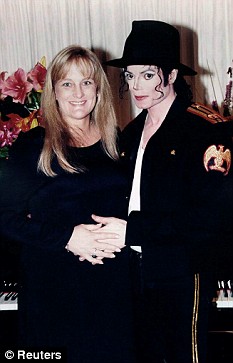
Michael Jackson, the weirdness, the worship
I read about Michael Jackson’s death this morning, about ten minutes before leaving for the last day of my TEFL course. On the bus I reflected that death may have come as a relief to the man; the casting away of a life that was both public and secretive; luridly broadcast and darkly cloistered. I knew little of his life; I was surprised to learn that he’d been married and had left three children. A strange marriage, it must have been. This wedding photograph is not reassuring:
Jackson looks androgynous and inorganic; his wife stunned or drugged. Celebrities tend to have surreal and unhappy private lives: it may be that only strange people become famous in the first place; but also, fame, being cried up and talked about, puts the self under tremendous and destructive pressure. It would be better to be wholly unknown than to be rich and famous. In Ovid’s Metamorphoses, those who fall foul of the gods are transformed – into birds, animals, trees, plants. To be treated like a god is likewise to be transformed – and not happily; hence many celebrities seem somehow inorganic.
This afternoon Helen, one of my fellow TEFL trainees, told me of her friend’s failed marriage: “She married him because he was ugly, I mean really ugly. She’s beautiful so she thought he’d worship her. But he didn’t: he treated her like crap. And he was really ugly.”
This flummoxed me. Helen is educated, intelligent, and cultured, but she evidently didn’t think there was anything strange or reprehensible in wanting to be worshipped, or in marrying someone for such a weird purpose. I wasn’t surprised that her friend’s marriage hadn’t worked out; or that the intended worshipper had instead treated her with contempt. A relationship founded on illusion and vanity would tilt disastrously, one way or another: the woman in question wanted a master/slave relationship and got it, just the wrong way round. She wanted to be worshipped, as (I suppose) do most celebrities: one may as well wish to be transformed into a stone or a spider, to become less than human. And since it is not possible to cease to be human, one will instead be weirdly human, more like a mannequin than a man. One’s fame then becomes an obscuring cloud, in which one is untouchable; and so the more desperate to touch, the more unsure and strange in one’s longing.
Helen’s friend wanted to be treated like a goddess; that is, to be taken for something she was not. She could then have believed in her believer, accepted his vision as the truth, and so seen herself as a goddess. It is as if a woman were to set up false and flattering mirrors, so she could see herself as beautiful: such people are always covertly and absolutely dependent on their worshippers. To be cried up is to be caged, unless one sees adulation with a rightly cold eye, as mere opinion, as what people think about you rather than what you are. The celebrity wants to construct a simulacrum out of other people’s opinions, pretending this is who he really is. By holding this false view of himself his real humanity becomes insubstantial and strange; he becomes himself something of a simulacrum.
Many people would like to be mistaken for a god; but that is really the desire to inhabit a false opinion, and so to become false, weirdly human, and distinctly ungodlike. It is better to try to be a decent human being; and then one may become a little godlike, as it were by accident, unknowing.
Latest posts by Walter Aske (Posts)
- Filthy flatmates - March 1, 2010
- The working week - January 12, 2010
- Advice for young people - December 30, 2009
- On hating and not hating art - August 17, 2009
- The pleasures of poverty - July 12, 2009
 Print This Post
Print This Post





Discussion Area - Leave a Comment